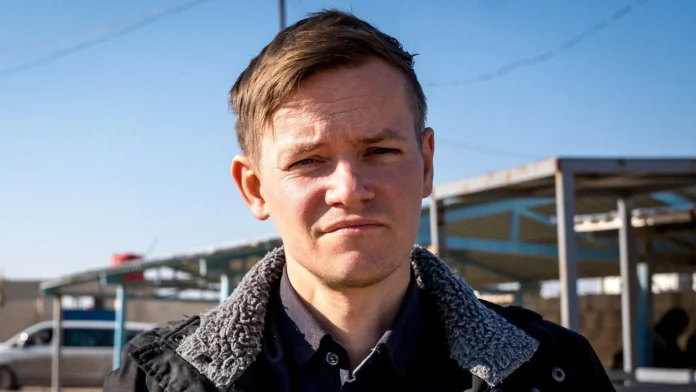Swedish journalist Joakim Medin, detained in Turkey last week on terrorism-related allegations, was arrested on March 29 and transferred two days later to Silivri Prison, a facility long associated with the incarceration of government critics, opposition figures and dissidents.
Medin’s arrest has drawn international concern, but his incarceration pending trial in Silivri, Turkey’s largest and most politically symbolic prison, has amplified fears over the country’s treatment of journalists and dissenters.
Medin was detained on March 27 upon arrival at Istanbul Airport. Turkish authorities accuse him of “membership in an armed terrorist organization” and “insulting the president,” citing his alleged attendance at a 2023 Stockholm rally involving supporters of the outlawed Kurdistan Workers’ Party (PKK). His family and employer have denied these allegations and also said the reason for his latest visit to Turkey was a reporting assignment.
His detention and subsequent arrest have sparked an outcry from international press freedom groups and the Swedish government, which has called for his immediate release and demanded consular access.
Located about 70 kilometers west of Istanbul, Silivri Prison was initially designed to house around 11,000 inmates but has consistently operated above capacity. The facility gained notoriety after a coup attempt in 2016, when it became the main holding site for thousands of suspected members of the faith-based Gülen movement, inspired by the late Muslim cleric Fethullah Gülen.
President Recep Tayyip Erdoğan has been targeting followers of the Gülen movement since corruption investigations revealed in December 2013 implicated then-prime minister Erdoğan as well as some members of his family and inner circle.
Dismissing the investigations as a Gülenist coup and a conspiracy against his government, Erdoğan designated the movement as a terrorist organization and began to target its members. He intensified the crackdown on the movement following the abortive putsch in 2016 that he accused Gülen of masterminding. The movement strongly denies involvement in the coup attempt or any terrorist activity.
The prison has also held prominent political figures and journalists, including philanthropist Osman Kavala, Kurdish politician Selahattin Demirtaş and executives from opposition media outlets. Hidayet Karaca, former head of the Samanyolu Media Group, has spent more than eight years in a one-person cell in Silivri on charges based on alleged links to the Gülen movement.
Conditions at Silivri have drawn repeated criticism from human rights groups. Reports by Human Rights Watch and Amnesty International cite overcrowding, inadequate medical care and extended pretrial detention. During the COVID-19 pandemic, HRW warned that vulnerable prisoners in Silivri were at heightened risk due to poor health infrastructure and limited protections.
Silivri Prison has faced extensive criticism for alleged human rights abuses, including reports of torture and inhumane treatment. Inmates have reported mistreatment during headcounts, inadequate food provisions and limited access to hot water. Some prisoners with health issues have claimed delays or denials in medical treatment, with requests for hospital transfers often unapproved. Overcrowding has exacerbated these problems, leading to unsanitary conditions and the spread of diseases such as scabies.
Human rights organizations have documented a resurgence of torture and ill-treatment in Turkish custody since 2016, with security officers allegedly targeting specific groups, including Kurds, members of the Gülen movement and leftists. Reports include severe beatings, threats and sexual assault, often aimed at extracting confessions or forcing detainees to implicate others.
As of February 2025, Turkey’s prison population stood at 392,456, up nearly 50,000 in seven months, according to official figures. Advocacy groups say the surge reflects the increasing use of imprisonment to silence political dissent and critical media.
Press freedom organizations, including Reporters Without Borders and the International Federation of Journalists, have condemned Medin’s detention as politically motivated.
Medin remains in custody at Silivri, reportedly in good spirits, though separated from other inmates. No trial date has been set.















